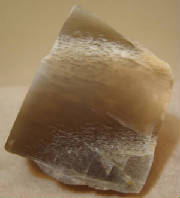|
Moonstone Specimens
The moonstone is characterised
by an enchanting play of light. Indeed it owes its name to that mysterious shimmer which always looks different when the stone
is moved and is known in the trade as 'adularescence'. In earlier times, people believed they could recognise in it the crescent
and waning phases of the moon.
Moonstones from Sri Lanka, the classical country of origin of the moonstone, shimmer
in pale blue on an almost transparent background. Specimens from India feature a nebulous interplay of light and shadow on
a background of beige-brown, green, orange or brown. These discreet colours, in connection with the fine shimmer, make the
moonstone an ideal gemstone for jewellery with a sensual, feminine aura.
This enchanting gemstone belongs to the large mineral group of the feldspars, of which almost two thirds
of all the rocks on Earth consist. The moonstone is actually the feldspar variety known as 'adularia', a potassium aluminosilicate
of gemstone quality, which is also found in the European Alps near the Adula Group – hence the name 'adularia'.
|
|

|
| Click on photo to enlarge in new window. |
|
Classic specimen of grey Indian moonstone polished on one side. Approx. size: 40x55x28 Weight: 116.6 grams
|
|
|